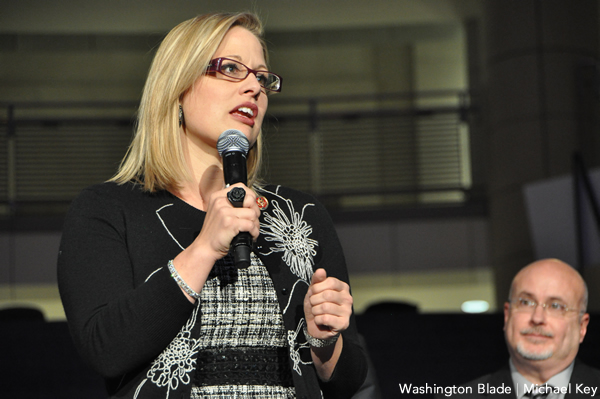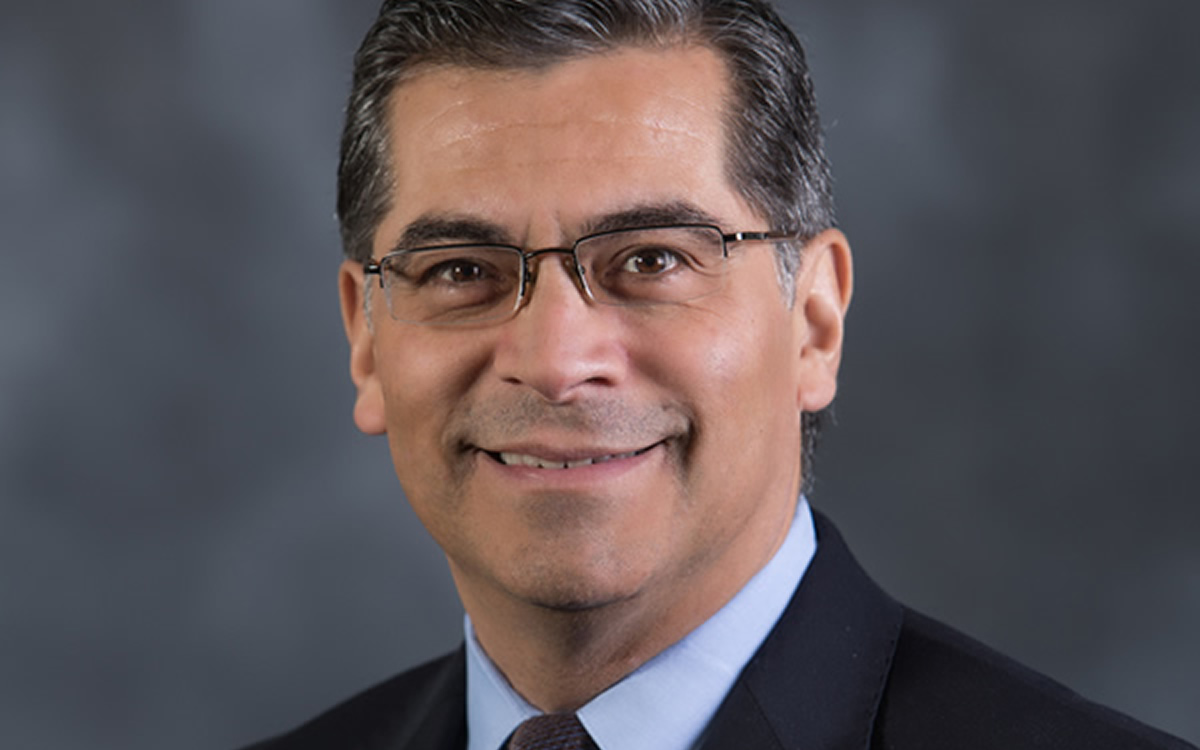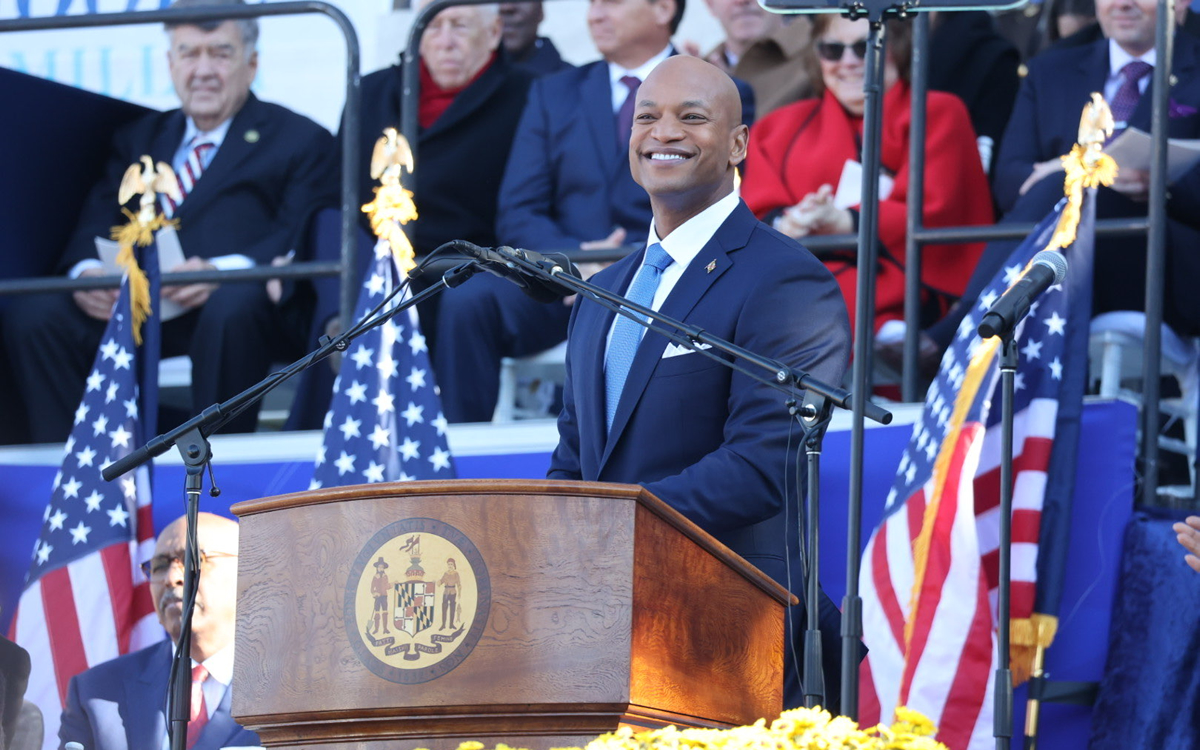News
LGBTQ groups stop short of criticizing Sinema for obstructing filibuster reform
Bisexual senator rebuffs Biden on voting rights proposal

Despite an out bisexual being among two Democrats responsible for thwarting President Biden’s call to advance voting rights, LGBTQ groups that supported Sen. Kyrsten Sinema (D-Ariz.) stopped short of criticizing her directly for impeding legislation at the top of progressives’ wish lists.
Although the change being sought was limited to voting rights legislation, the refusal from Sinema to change the filibuster rule, which requires 60 votes to move legislation to the Senate floor as opposed to a simple majority, effectively put a stake in the heart of the legislative agenda for Democrats, including any possibility of enacting LGBTQ civil rights legislation like the Equality Act.
The Human Rights Campaign, the nation’s leading LGBTQ group, declined to identify Sinema by name in an organizational statement provided by a spokesperson via email in response to a Washington Blade inquiry on her refusal to change the filibuster to pass voting rights legislation.
“The core of our democracy is the right to vote,” the statement says. “The United States Senate must act on legislation to protect that right now, including passage of federal voting rights and voting protection legislation. Without its essential safeguards guaranteeing that the voices of all voters — including LGBTQ+ Black, Brown and other minority voters — will be heard at the ballot box, we cannot ensure that any other right, even those currently enshrined in law, will be protected in the years to come.”
The closest the statement comes to criticizing Sinema, without actually doing so, is the final line: “As a result, we feel that it is necessary for the Senate to take whatever actions are required, including changes to Senate rules, to ensure a majority to pass this essential legislation.”
The Human Rights Campaign endorsed Sinema in the past as a candidate for U.S. Senate and hosted her as a special guest for fundraising and promotional events. It should be noted, JoDee Winterhof, HRC’s senior vice president of policy and political affairs, once worked for Sinema as chief of staff.
Asked whether HRC’s position was informed by Winterhof’s past work, the spokesperson replied: “Many of our staff have experience working on the Hill. Regardless of who they have worked for, we continue to believe that it is necessary for the Senate to take whatever actions are required, including changes to the Senate rules, to pass federal voting reform.”
Moments before Sinema was set last Thursday to meet with Biden on the filibuster, she took to the Senate floor preemptively and declared she wouldn’t budge.
“There’s no need for me to restate my long-standing support for the 60-vote threshold to pass legislation,” Sinema said.
Added Sinema: “When one party need only negotiate with itself, policy will inextricably be pushed from the middle towards the extremes,” adding that she doesn’t support that outcome and “Arizonans do not either.”
Joining Sinema in refusing to budge on the filibuster is her fellow moderate Sen. Joe Manchin (D-W.Va.), who has proposed alternatives to the current state of Senate rules, but ultimately rejected the changes proposed by the caucus.
In contrast to the relatively muted response from LGBTQ groups, other civil rights organizations were quick to denounce Sinema and Manchin for supporting the filibuster, calling the Senate rules as they stand Jim Crow 2.0. Late Monday, Emily’s List announced it would no longer support Sinema for re-election over her position on voting rights.
Martin Luther King III, the son of the late civil rights leader, compared Manchin and Sinema to white moderates who half-heartedly supported his father’s work.
“History will not remember them kindly,” the younger King said, referring to Sinema and Manchin by name, according to PBS News Hour.
One exception to LGBTQ groups declining to criticize Sinema was the National LGBTQ Task Force, which said the senator should be coming up with alternatives to filibuster reform.
Kierra Johnson, executive director of the Task Force, said she’s been “asking questions because Sen. Sinema is known for being a supporter of so many pieces of progressive legislation and culture change related to queer people and women’s civil and human rights.”
“I want to see better and more, right?” Johnson said. “Yes, we should be working to build bridges across the aisle, across political ideology, but for me, the question is if you’re not going to support filibuster reform, then what are you supporting, and what is the pathway forward?”
Johnson added Sinema “owes it to the people who have supported her over the years to come up with these alternatives if she won’t support filibuster reform.”
Asked whether the Task Force has done any outreach to Sinema, Johnson said the organization is “in the process of trying to meet with her folks” and looking at ways to bring to her voices from LGBTQ movement community leaders.
Biden’s call to reform the filibuster — even though it was limited to voting rights legislation — may have been dead on arrival as Sinema and Manchin have consistently resisted efforts in the Senate to reform the filibuster. The efforts to change Senate rules, however, appeared to have new strength after Biden’s speech in Georgia last week making a plea for reform based on the Jan. 6 insurrection at the U.S. Capitol and the restrictive voting law passed in that state.
White House Press Secretary Jen Psaki, asked Friday about Sinema and Manchin refusing to budge on the filibuster, said the administration would continue to push for voting rights legislation.
“I would say that the president’s view, as you heard him say yesterday, is that we’re going to continue to press to get this done moving forward,” Psaki said. “And that means continuing to engage with a range of officials who are supportive, some who have questions and some who are skeptical.”
Psaki pointed out Biden ended up having the meeting with Sinema despite her remarks on the floor, adding “that’s evidence of his continued commitment to keep engaging.”
The LGBTQ community, as with any issue, isn’t uniform in thinking Sinema should be obligated to have a certain view against the filibuster simply because she’s bisexual, or that LGBTQ groups should criticize her for being obstructionist.
One LGBTQ strategist, who agreed to talk on condition of anonymity, outright rejects calls for Sinema to support a change in rules because the filibuster “ensures that minority perspectives cannot be trampled by majoritarianism.”
“Portraying an LGBTQ woman as a gender and sexuality traitor shows a deep disrespect for our history,” the strategist added. “Sinema’s success in fighting for working families, vulnerable populations and LGBTQ rights is grounded in the belief that building large coalitions is how to best effect legal and social changes. Naturally, it follows she would be against a change in decades of Senate precedent that would prioritize hyper partisanship over persuasion.”
Biden’s speech in Georgia may have been more of an attempt to excite the progressive base as opposed to making a strategic push for filibuster reform. After all, his popularity is at an all-time low, which limits his influence. A POLITICO/Morning Consult poll asking voters to grade Biden after his first year in office found 37 percent gave him an “F,” compared to the 31 who gave either “A” and “B,” which is a touch worse than Trump at this point in his presidency.
The LGBTQ Victory Fund, which has endorsed Sinema in the past, declined to make any declarations about withholding an endorsement when asked by the Washington Blade.
“Our Victory Fund Campaign Board – made up of more than 150 political leaders and advocates from across the country – votes to determine our endorsements,” said Elliot Imse, a Victory Fund spokesperson. “If Sen. Sinema runs for reelection, a review of her record as it relates to equality will of course be a primary consideration for whether she receives our endorsement. That board vote would take place, if she applies for endorsement, in late 2023 or 2024.”
Imse added as a U.S. senator Sinema is not currently up for election because after being elected in 2018 she is set to hold her seat for another four years.
“Sen. Sinema is not currently endorsed by Victory Fund and is not on an active ballot,” Imse said. “We last endorsed her in 2018 when she was running against Martha McSally – a right-wing extremist candidate vociferously opposed to equality for LGBTQ people.”
Federal Government
HHS reverses Trump-era anti-LGBTQ rule
Section 1557 of the Affordable Care Act now protects LGBTQ people

The U.S. Department of Health and Human Services Office for Civil Rights has issued a final rule on Friday under Section 1557 of the Affordable Care Act advancing protections against discrimination in health care prohibiting discrimination on the basis of race, color, national origin, age, disability, or sex (including pregnancy, sexual orientation, gender identity, and sex characteristics), in covered health programs or activities.
The updated rule does not force medical professionals to provide certain types of health care, but rather ensures nondiscrimination protections so that providers cannot turn away patients based on individual characteristics such as being lesbian, gay, bisexual, transgender, queer, intersex, or pregnant.
“This rule ensures that people nationwide can access health care free from discrimination,” said HHS Secretary Xavier Becerra. “Standing with communities in need is critical, particularly given increased attacks on women, trans youth, and health care providers. Health care should be a right not dependent on looks, location, love, language, or the type of care someone needs.”
The new rule restores and clarifies important regulatory protections for LGBTQ people and other vulnerable populations under Section 1557, also known as the health care nondiscrimination law, that were previously rescinded by the Trump administration.
“Healthcare is a fundamental human right. The rule released today restores critical regulatory nondiscrimination protections for those who need them most and ensures a legally proper reading of the Affordable Care Act’s healthcare nondiscrimination law,” said Omar Gonzalez-Pagan, counsel and health care strategist for Lambda Legal.
“The Biden administration today reversed the harmful, discriminatory, and unlawful effort by the previous administration to eliminate critical regulatory protections for LGBTQ+ people and other vulnerable populations, such as people with limited English proficiency, by carving them out from the rule and limiting the scope of entities to which the rule applied,” Gonzalez-Pagan added. “The rule released today has reinstated many of these important protections, as well as clarifying the broad, intended scope of the rule to cover all health programs and activities and health insurers receiving federal funds. While we evaluate the new rule in detail, it is important to highlight that this rule will help members of the LGBTQ+ community — especially transgender people, non-English speakers, immigrants, people of color, and people living with disabilities — to access the care they need and deserve, saving lives and making sure healthcare professionals serve patients with essential care no matter who they are.”
In addition to rescinding critical regulatory protections for LGBTQ people, the Trump administration’s rule also limited the remedies available to people who face health disparities, limited access to health care for people with Limited English Proficiency, and dramatically reduced the number of healthcare entities and health plans subject to the rule.
Lambda Legal, along with a broad coalition of LGBTQ advocacy groups, filed a lawsuit challenging the Trump administration rule, Whitman-Walker Clinic v. HHS, and secured a preliminary injunction preventing key aspects of the Trump rule from taking effect.
These included the elimination of regulatory protections for LGBTQ people and the unlawful expansion of religious exemptions, which the new rule corrects. The preliminary injunction in Whitman-Walker Clinic v. HHS remains in place. Any next steps in the case will be determined at a later time, after a fulsome review of the new rule.
GLAAD President Sarah Kate Ellis released the following statement in response to the news:
“The Biden administration’s updates to rules regarding Section 1557 of the ACA will ensure that no one who is LGBTQI or pregnant can face discrimination in accessing essential health care. This reversal of Trump-era discriminatory rules that sought to single out Americans based on who they are and make it difficult or impossible for them to access necessary medical care will have a direct, positive impact on the day to day lives of millions of people. Today’s move marks the 334th action from the Biden-Harris White House in support of LGBTQ people. Health care is a human right that should be accessible to all Americans equally without unfair and discriminatory restrictions. LGBTQ Americans are grateful for this step forward to combat discrimination in health care so no one is barred from lifesaving treatment.”

Maryland Gov. Wes Moore on Thursday signed a bill that seeks to combat efforts to ban books from state libraries.
House Bill 785, also known as the Freedom to Read Act, would establish a state policy “that local school systems operate their school library media programs consistent with certain standards; requiring each local school system to develop a policy and procedures to review objections to materials in a school library media program; prohibiting a county board of education from dismissing, demoting, suspending, disciplining, reassigning, transferring, or otherwise retaliating against certain school library media program personnel for performing their job duties consistent with certain standards.”
Moore on Thursday also signed House Bill 1386, which GLSEN notes will “develop guidelines for an anti-bias training program for school employees.”

The Mexican Senate on Thursday approved a bill that would ban so-called conversion therapy in the country.
Yaaj México, a Mexican LGBTQ rights group, on X noted the measure passed by a 77-4 vote margin with 15 abstentions. The Chamber of Deputies, the lower house of Mexico’s congress, approved the bill last month that, among other things, would subject conversion therapy practitioners to between two and six years in prison and fines.
The Senate on its X account described conversion therapy as “practices that have incentivized the violation of human rights of the LGBTTTIQ+ community.”
“The Senate moved (to) sanction therapies that impede or annul a person’s orientation or gender identity,” it said. “There are aggravating factors when the practices are done to minors, older adults and people with disabilities.”
Mexico City and the states of Oaxaca, Quintana Roo, Jalisco and Sonora are among the Mexican jurisdictions that have banned the discredited practice.
The Senate in 2022 passed a conversion therapy ban bill, but the House of Deputies did not approve it. It is not immediately clear whether President Andrés Manuel López Obrador supports the ban.
Canada, Brazil, Belgium, Germany, France, and New Zealand are among the countries that ban conversion therapy. Virginia, California, and D.C. are among the U.S. jurisdictions that prohibit the practice for minors.
-

 District of Columbia4 days ago
District of Columbia4 days agoCatching up with the asexuals and aromantics of D.C.
-

 South America4 days ago
South America4 days agoArgentina government dismisses transgender public sector employees
-

 Maine5 days ago
Maine5 days agoMaine governor signs transgender, abortion sanctuary bill into law
-

 Mexico3 days ago
Mexico3 days agoMexican Senate approves bill to ban conversion therapy









